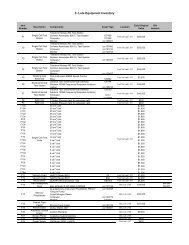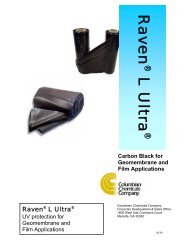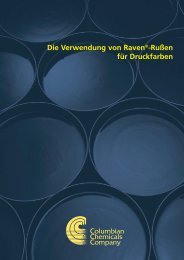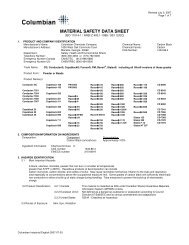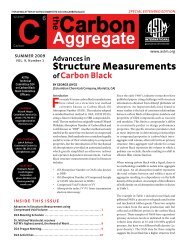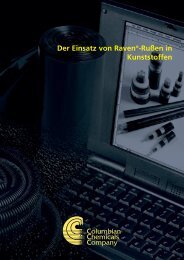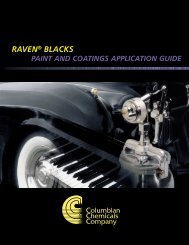Typical Properties of Industrial Carbon Blacks - Columbian Chemicals
Typical Properties of Industrial Carbon Blacks - Columbian Chemicals
Typical Properties of Industrial Carbon Blacks - Columbian Chemicals
Create successful ePaper yourself
Turn your PDF publications into a flip-book with our unique Google optimized e-Paper software.
TONERS<br />
INK<br />
<strong>Industrial</strong> <strong>Carbon</strong> <strong>Blacks</strong> are used in a wide variety <strong>of</strong> applications including printing inks, toners, coatings,<br />
plastics, paper and building products. The selection <strong>of</strong> a specific carbon black application<br />
depends on the end product requirements as well as processing conditions.<br />
INDUSTRIAL CARBON BLACK APPLICATIONS<br />
ULTRA® INDUSTRIAL CARBON BLACKS<br />
<strong>Columbian</strong> furnace carbon blacks are high performance<br />
carbons which are used in demanding applications.<br />
<strong>Carbon</strong> black purity and consistency <strong>of</strong> performance,<br />
always important, are now recognized as being critical to<br />
continuing quality improvement. <strong>Columbian</strong>, committed<br />
to improving its quality and meeting the needs <strong>of</strong> the customers<br />
it serves, has developed furnace carbons that are<br />
<strong>of</strong> the highest purity available. These are referred to as<br />
Ultra® carbons.<br />
Ultra® carbon blacks benefit various application systems<br />
by providing greater uniformity, increased compatibility,<br />
improved dispersion, better processing, longer screen life,<br />
jetter color development, and reduced scrap. <strong>Columbian</strong>'s<br />
Ultra® performance carbons are designed for use in critical<br />
quality products with cost effective benefits.<br />
PUREBLACK® <strong>Carbon</strong>s are a new family <strong>of</strong> carbon blacks<br />
<strong>of</strong>fering exceptional chemical purity and performance.<br />
They present unique benefits including negligible moisture<br />
pickup, low to nil Sulfur, higher electrical and thermal<br />
conductivities, increased oxidation resistance and are<br />
compliant with FDA regulation 21 CFR 178.3297.<br />
PUREBLACK® <strong>Carbon</strong>s are uniquely suited for moisture<br />
sensitive systems and high temperature applications.They<br />
provide processing advantages such as ease <strong>of</strong> dispersion<br />
and higher masterbatch loading capability compared to<br />
other FDA compliant carbon blacks. In conductive applications<br />
including high voltage cables and curing bladders,<br />
PUREBLACK® <strong>Carbon</strong>s <strong>of</strong>fer significant performance<br />
advantages over acetylene black.<br />
COATINGS may be formulated with an extremely wide<br />
range <strong>of</strong> <strong>Columbian</strong> carbon blacks, ranging from Raven®<br />
410 for low-cost utility finishes to Raven® 5000 Ultra® II &<br />
Raven® 5000 Ultra® III for high quality, extremely jet, blue<br />
undertone automotive applications. <strong>Carbon</strong> blacks primarily<br />
used for tinting are coarse and have broad<br />
particle size distributions. Grades with these properties<br />
provide good economics coupled with a desired blue tone<br />
and best resistance to flooding and flocculation. For use in<br />
machine colorant concentrates, coarse carbon blacks,<br />
especially the lampblack replacements are usually specified.<br />
Raven® 14, a post-treated lampblack replacement, can<br />
provide sufficient mass color, strong tint strength, high<br />
loading capability and good dispersibility.<br />
PLASTICS<br />
COATINGS<br />
PLASTICS carbon black requirements are also diverse.<br />
<strong>Carbon</strong> black may be incorporated into thermosets or<br />
thermoplastics for color, tint or functional reasons. The<br />
entire spectrum <strong>of</strong> carbon blacks is employed in mass<br />
color plastic applications and use will depend upon<br />
loading, dispersion and cost. Again as in coatings, the<br />
coarser carbon blacks are excellent choices in applications<br />
where blue tone, tint strength, ease <strong>of</strong> dispersion and high<br />
gloss are preferred. <strong>Carbon</strong> blacks, marketed under the<br />
Conductex® trade name, provide different degrees <strong>of</strong><br />
electrical conductivity for a wide range <strong>of</strong> plastics requirements.<br />
Conductex® 7055 Ultra <strong>of</strong>fers optimum conductivity<br />
with minimal contribution to viscosity in applications<br />
such as wire & cable, ESD, as well as conductive coatings.<br />
By contrast, oxidized carbon blacks such as Raven® 1255<br />
tend to be less conductive and may be used where<br />
controlled electrical insulating properties are required.<br />
Fiber applications benefit from the excellent filterability <strong>of</strong><br />
Raven® 1190 Ultra® and Raven® 1220 Ultra®. For applications<br />
requiring very high jetness such as engineering<br />
plastics parts, Raven 2000 and Raven® 2500 Ultra® are<br />
recommended.<br />
INK grade carbon blacks are generally medium to coarse<br />
in particle size and are used for their masstones rather<br />
than tint properties. In fluid ink applications such as publication<br />
and packaging gravure, Raven® 450 and 460 are<br />
widely used because <strong>of</strong> their rheology, ease <strong>of</strong> dispersion<br />
and blue tone. The standard for news ink applications is<br />
Raven® 690 oil beads. High quality paste (oil) inks may be<br />
formulated with Raven®760 Ultra®, 860 Ultra®, 1100 Ultra®,<br />
1000, or 1255 depending on specific requirements.<br />
Numerous <strong>Columbian</strong> carbon blacks have been specially<br />
engineered for specific industries. Raven® H2O is a<br />
surfactant-treated carbon black which is extremely<br />
hydrophilic and is thus useful in the building product<br />
industries for applications such as ro<strong>of</strong>ing granules and<br />
concrete mortar, and in the paper industry where low<br />
shear dispersibility is required. Raven® 1190 Ultra® and<br />
Raven® 1220 Ultra® have been developed for the fiber<br />
industry. Raven® UV Ultra® is an industry standard for ultra<br />
violet protection.



